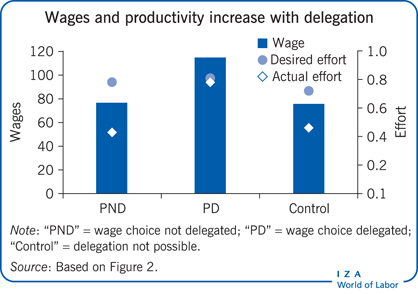Elevator pitch
Economists typically predict that people are inherently selfish; however, experimental evidence suggests that this is often not the case. In particular, delegating a choice (such as a wage) to the performing party may imbue this party with a sense of responsibility, leading to improved outcomes for both the delegating entity and the performing party. This strategy can be risky, as some people will still choose to act in a selfish manner, causing adverse consequences for productivity and earnings. An important issue to consider is therefore how to encourage a sense of responsibility in the performing party.

Key findings
Pros
Delegating the choice of wage (as well as effort) to the worker leads to higher earnings for both firms and workers as determined through laboratory experimentation.
Social comparisons concerning delegation rights affect workers’ behavior; this suggests that people intrinsically care about their social perception within the working environment.
When one is responsible for the determination of an outcome, as is encouraged by the delegation of responsibility to workers, one tends to behave more pro-socially (i.e. cooperatively).
Cons
Both the delegator and the performing party can strategically take advantage of delegation in order to advance anti-social (or selfish) goals.
Giving responsibility to a self-interested party regarding expected effort has its risks, since he or she may not choose to exert high levels of effort, leading to a situation in which the delegator will suffer.
Empirical evidence on the effects of wage delegation is scarce, since only a handful of firms have, in real life, delegated the decision about wage setting to their employees.